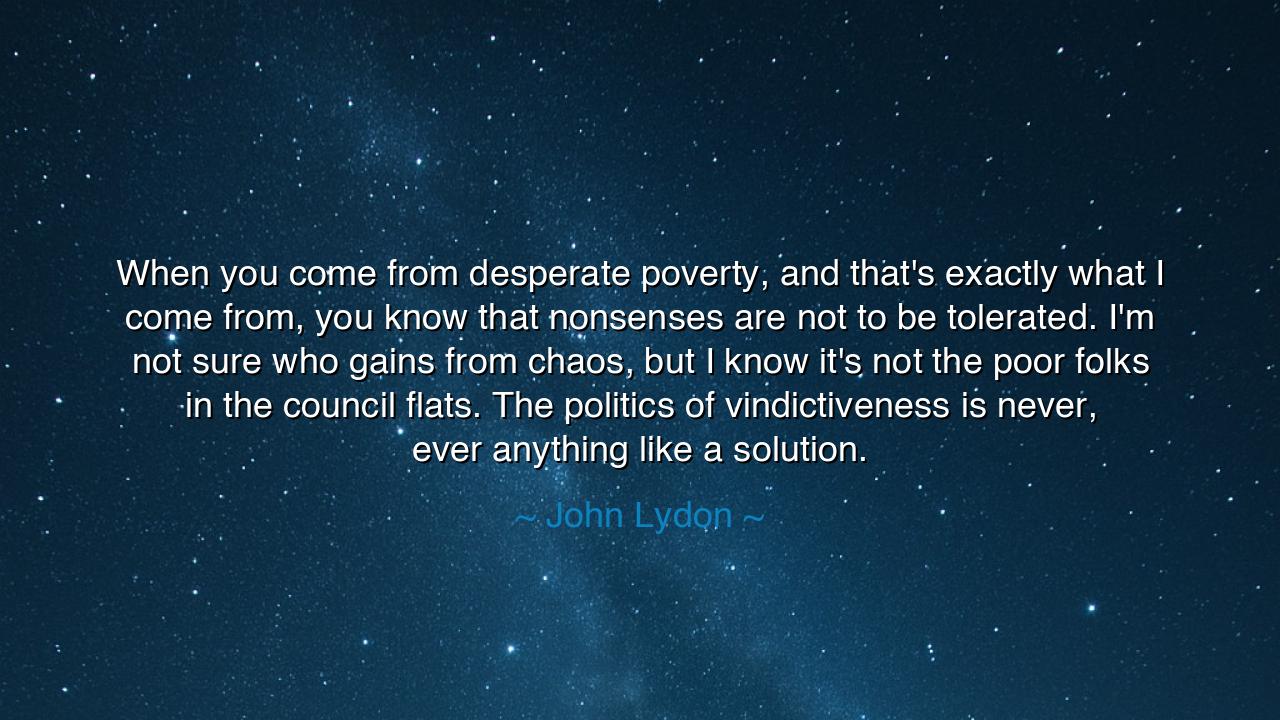
When you come from desperate poverty, and that's exactly what I
When you come from desperate poverty, and that's exactly what I come from, you know that nonsenses are not to be tolerated. I'm not sure who gains from chaos, but I know it's not the poor folks in the council flats. The politics of vindictiveness is never, ever anything like a solution.






Hear, O sons and daughters of the struggle, the words of John Lydon, born from hardship, who declared: “When you come from desperate poverty, and that’s exactly what I come from, you know that nonsenses are not to be tolerated. I’m not sure who gains from chaos, but I know it’s not the poor folks in the council flats. The politics of vindictiveness is never, ever anything like a solution.” In this utterance lies the wisdom of one who has tasted hunger, endured cold walls, and learned that for the poor, survival leaves no room for empty games.
For desperate poverty strips away illusion. Those who dwell in council flats, or in shanties, or in the shadows of empire, know that every coin counts, every loaf of bread is a victory, and every roof is a fragile shield against despair. To such souls, the nonsenses of politics—the feuds, the games of pride, the vendettas dressed as policies—are revealed for what they are: distractions that cost the vulnerable their dignity, their chance at stability, their very lives.
History speaks of the French Revolution, when the people of Paris cried out not for revenge, but for bread. Yet in the chaos that followed, when guillotines rose and vindictiveness reigned, the poor found themselves no freer than before. The throne was gone, but hunger remained. Power changed hands, but those who suffered most gained little. Thus Lydon’s warning rings true across centuries: politics of vindictiveness yields no harvest but blood, and those in want are always the first to pay the price.
The true calling of leadership, then, is not to stir bitterness, but to seek remedies. The poor cannot eat rhetoric, nor can they clothe themselves in the ashes of revenge. What they require are homes that stand, work that sustains, and governance that steadies rather than fractures. To waste the energy of nations on chaos is to betray those whose lives hang by the thinnest thread.
Therefore, let this wisdom be preserved: those born from poverty see clearly what others forget—that life is too fragile, too sacred, to be spent on spite. The path forward lies not in vindictiveness but in justice, not in chaos but in compassion. For the measure of a society is not how it rewards the powerful, but how it lifts the least of its people. Let all leaders hear Lydon’s cry and remember: the poor do not need your quarrels—they need your care.






HNHuynh Nguyen
John Lydon’s critique of political chaos and vindictiveness is a stark reminder of the disconnect between those in power and the everyday struggles of the poor. If the poor are the ones who suffer most from such tactics, then why does it seem like chaos is always at the forefront of political strategy? How can we shift the focus to real, effective change that addresses the underlying issues, rather than constantly reacting to divisive politics?
MPTran Thi Mai Phuong
Lydon’s quote really makes me think about how political decisions often ignore the very people they’re supposed to serve. Chaos and vindictiveness may drive political narratives, but they don’t solve the real issues that impact people living in poverty. How do we refocus the political agenda on real, practical solutions for those at the bottom of the economic ladder? And can we get past the point of blaming each other and finally start working together?
TNThao Nguyen
I totally agree with Lydon that the poor are often the ones who bear the brunt of political chaos. How do we stop the cycle of political vendettas and focus on actual solutions? It seems like politicians often thrive on division, but that doesn’t help the people who are truly in need. How can we bring more empathy into political decision-making so that the voices of those in poverty are not drowned out?
HQNguyen hoang quan
Lydon’s perspective on chaos and politics is eye-opening. The reality of poverty is often ignored in political discussions, with people in positions of power rarely understanding what it means to struggle. But when he says that ‘nonsense is not to be tolerated,’ it makes me wonder: how do we create a political environment that truly reflects the needs of the poor? Is it possible to move beyond the politics of resentment and actually create policies that help?
VNVan Nam
John Lydon’s words about coming from desperate poverty hit home. It’s frustrating to think about how often the political discourse revolves around chaos and vindictiveness rather than solutions for the people who truly need them. Who benefits from a system that thrives on division and turmoil? And why is it always the most vulnerable who suffer the most? Is there a way we can break this cycle of negativity and actually create meaningful change for those at the bottom?